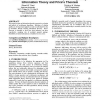281 search results - page 7 / 57 » Learning to Apply Theory of Mind |
GECCO
2006
Springer
13 years 11 months ago
2006
Springer
This paper presents an information theoretic perspective on design and analysis of evolutionary algorithms. Indicators of solution quality are developed and applied not only to in...
ECAL
2005
Springer
14 years 1 months ago
2005
Springer
Typically, multi-agent models for studying the evolution of perceptually grounded lexicons assume that agents perceive the same set of objects, and that there is either joint atten...
METRICS
1997
IEEE
13 years 11 months ago
1997
IEEE
Schlumberger RPS successfully applies software measurement to support their software development projects. It is proposed that the success of their measurement practices is mainly...
AAAI
1993
13 years 8 months ago
1993
learning (EBL) component. In this paper we provide a brief review of FOIL and FOCL, then discuss how operationalizing a domain theory can adversely affect the accuracy of a learned...
COLT
2007
Springer
14 years 1 months ago
2007
Springer
Property testing deals with tasks where the goal is to distinguish between the case that an object (e.g., function or graph) has a prespecified property (e.g., the function is li...

